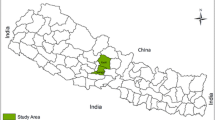Abstract
Ghana’s urban population is projected to grow from the current 52% of the total population to about 65% by 2030. Such a growth rate certainly has far reaching implications for natural environments within urban centers, particularly in the face of current economic pressures. Kumasi, Ghana’s second largest city was for a long time known as the Garden city of West Africa. This status seems however to have been traded in favor of policy for urban development. In the particular case of the Kumasi forest reserve this chapter assesses the total economic use value of the forest and the factors, which influence such value through a Hedonic Price Model. The total economic use value is then compared with the user cost of the forest, to draw some useful lessons for urban forestry from economic analysis. The comparison reveals that Ghana loses a net minimum of US$ 35 million per annum in carbon credits due to the deforestation of the Kumasi Forest Reserve. The chapter therefore concludes that developing economies should adopt urban forestry as a source of funding and resources for economic development and poverty alleviation.
Access this chapter
Tax calculation will be finalised at checkout
Purchases are for personal use only
Similar content being viewed by others

References
Ackerman F, Stanton EA (2010) The social cost of carbon. A report for the economics of equity and the environment network. Available via: http://www.e3network.org. Cited 10 July 2011
Bratkovick S, Bowyer J, Stai S, Fernholz K, Bratkovich J, Howe J (2010) Urban forestry: an evolving discipline. Dovetail Partners Inc. Available via: www.dovetailinc.org. Cited 10 Dec 2011
Brown K, Pearce D (1994) The Economic value of non-market benefits of tropical forests: carbon storage. In: Weiss J (ed) The economics of project appraisal and the environment. Edward Elgar Publishing Limited, Hants
Food and Agricultural Organization of the United Nations (FAO) (2001) Forestry Outlook Study for Africa (FOSA) Ghana, 2nd draft. FAO, Rome, Italy
Food and Agricultural Organization of the United Nations (FAO) (2011) State of world’s forests 2011. FAO, Rome, Italy
Houghton RA, Boone RD, Fruci JR, Hobbie JE, Melillo JM, Palm CA, Peterson BJ, Shaver GR, Woodwell GM, Moore B, Skole DL, Myers N (1987) The flux of carbon from terrestrial ecosystems to the atmosphere in 1980 due to changes in land use: geographical distribution of the global flux. Tellus 39B:122–39
Kumasi Metropolitan Assembly (KMA) (2006). Available via: http://kma.ghanadistricts.gov.gh/?arrow=atd&_=6&sa=5476. Cited 15 Dec 2011
Manhyia Archives (2007) Records of Kumasi Traditional Council (MAG1) – classification list. Available via: http://www.manhyiaarchives.org/mag1_list.php?code=MAG1/7. Cited 15 Dec 2011
Mongabay.com (2006) Forest protection could earn tens of millions for Ghana. Available via: http://news.mongabay.com/2006/1106-ghana.html. Cited 10 May 2010
National Development Planning Commission (NDPC) Ghana (2010) Ghana shared growth and development agenda 2010–2013. Vol 1: Policy Framework. Accra, Ghana
Oracle Educational Foundation (2011) Tropical forest. Available via: htpp://library.thinkquest.org/17456/tropicalall.html. Cited 22 Dec 2011
Peters CM (1994) Sustainable harvest of non-timber plant resources in Tropical Moist forest: an ecological primer. Available via: htpp://www.worldwidelife.org/bsp/bcn/learning/primer/eng1.htm. Cited 05 Mar 2008
Roos A (1996) A hedonic price function for forest land in Sweden. Can J Forest Res 26:740–746
Sasaki N, Kim S (2009) Biomass carbon sinks in Japanese forests: 1966–2012. Forestry 82(1):2009. doi:10.1093/forestry/cpn049
Scarpa R, Buongiorno J, Hseu J, Abt KL (2000) Assessing the non-timber value of forests: a revealed-preference, hedonic model. J Forest Econ 6(2):83–107
Snyder SA, Kilgore MA, Hudson R, Donnay J (2007) Determinants of forest land prices on northern Minnesota: a hedonic pricing approach. Forest Sci 53(1):25–36
Snyder SA, Kilgore MA, Hudson R, Donnay J (2008) Influence of purchaser perceptions and intensions on price for forest and land parcels: a hedonic pricing approach. J Forest Econ 14:47–72. Available via: www.sciencedirect.com. Cited 20 Jan 2010
Tang GR (2010) Feature: forest degradation/deforestation in Ghana. Available via: News: http://news.myjoyonline.com/features/201012/57642.asp. Cited 01 May 2011
Tontoh AA (2011) A study to ascertain the growth situation of the Kumasi Metropolitan Area (KMA): a remote sensing approach. Dissertation, Kwame Nkrumah University of Science and Technology
Turner R, Newton CM, Dennis DF (1991) Economic relationships between parcel characteristics and price in the market for Vermont forestland. Forest Sci 37(4):1150–1162
Woods Consultancy Service (1999) Tourist guide in Kumasi Ashanti. Accra, Ghana
Author information
Authors and Affiliations
Corresponding author
Editor information
Editors and Affiliations
Rights and permissions
Copyright information
© 2013 Springer Science+Business Media Dordrecht
About this chapter
Cite this chapter
Quartey, J.D. (2013). An Economic Assessment of the Deforestation of Ghana’s Garden City of West Africa. In: Simpson, R., Zimmermann, M. (eds) The Economy of Green Cities. Local Sustainability, vol 3. Springer, Dordrecht. https://doi.org/10.1007/978-94-007-1969-9_30
Download citation
DOI: https://doi.org/10.1007/978-94-007-1969-9_30
Published:
Publisher Name: Springer, Dordrecht
Print ISBN: 978-94-007-1968-2
Online ISBN: 978-94-007-1969-9
eBook Packages: Earth and Environmental ScienceEarth and Environmental Science (R0)



